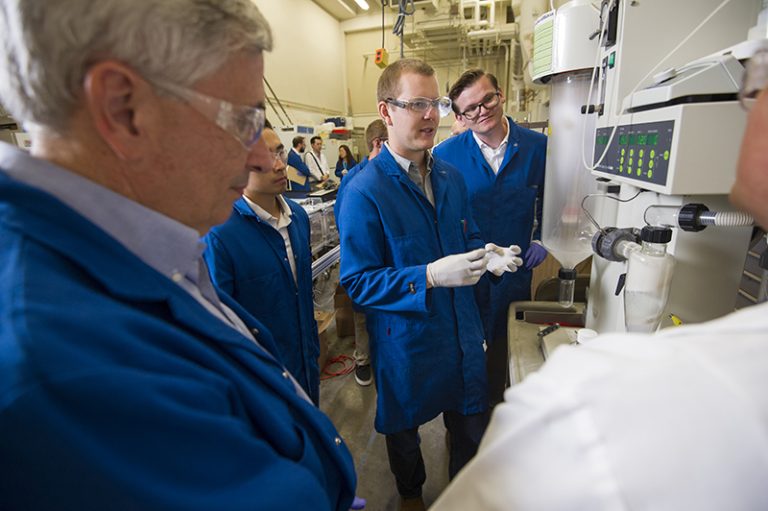BASF and UC Davis collaborating to unlock new potential in human milk oligosaccharides
/in News /by Aj Cheline
Top left to right: Marianne Heer (BASF), Anita Oberbauer (UC Davis), David Mills (UC Davis), Yan Qin (BASF), Helen Raybould (UC Davis), Daniela Barile (UC Davis), Yoram Barak (BASF), Bruce German (UC Davis), Xi Chen (UC Davis)
Lower left to right: Prasant Mohapatra (UC Davis), Benjamin Knudsen (BASF), Ahmad Hakim-Elahi (UC Davis), Stefan Rüdenauer (BASF), Dushyant Pathak (UC Davis)
The University of California, Davis (UC Davis), and BASF announced a collaboration to unlock new benefits of human milk oligosaccharides (HMOs). The long-term objective of this strategic research partnership is to develop and validate second-generation HMO molecules as potent bioactive compounds that can influence the establishment and maintenance of the gut microbiome and provide benefits beyond the gastrointestinal tract, such as brain health, for infants, children and adults.
Human milk contains a multitude of HMOs, a class of indigestible carbohydrates that is gaining recognition for a variety of health-promoting activities. Substantial evidence demonstrates that the high diversity of structures and concentration of HMOs in human milk contribute to improved health outcomes associated with breastfeeding.
“This collaboration is an essential cornerstone of our strategic initiative to become a leading science-based player in the fields of HMO and microbiome,” said Stefan Rüdenauer, director of Development and Scientific Marketing Human Nutrition at BASF.
The two-year partnership with UC Davis’ research team is part of BASF’s California Research Alliance (CARA), which brings together experts from major universities on the West Coast to collaborate on new materials and their applications, biosciences and related technologies.
“We are pleased to see this expansion to our existing collaborative engagement with BASF via the CARA network,” said Dushyant Pathak, associate vice chancellor for Technology Management & Corporate Relations in the UC Davis Office of Research. “BASF’s commitment to supporting innovation at UC Davis is resulting in direct benefit to our faculty researchers, to the company, to the region and to society at large through helping us realize societal benefit from cutting-edge university research.”
Professors Daniela Barile, David Mills, Helen Raybould, Xi Chen, and Bruce German from the Foods for Health Institute at UC Davis will use their collective expertise to reveal new applications for HMOs. BASF’s contributions to the partnership include its proficiency in fermentation products and the development of human nutrition solutions, as well as project funding.
“We are excited to partner with BASF to unlock novel HMO functionalities,” said Professor Barile. “This project will employ a range of microbiological and physiological studies employing cutting-edge glycomics and metagenomics tools to explore how HMOs interact with the human host and the microbes within them.”
About BASF
BASF Corporation, headquartered in Florham Park, New Jersey, is the North American affiliate of BASF SE, Ludwigshafen, Germany. BASF has more than 18,200 employees in North America, and had sales of $17.9 billion in 2017. For more information about BASF’s North American operations, visit www.basf.com.
About CARA
The California Research Alliance (CARA) is one of four BASF scientific excellence clusters that collaborate with research groups on a regional level, maintaining a network between BASF, the campuses of the University of California system, Stanford and Caltech. The researchers at CARA work in a variety of scientific disciplines including new materials, biosciences, formulations, and catalysis, as well as computational and engineering disciplines.
The CARA collaboration, started in 2014 with 10 postdoctoral positions, has been extended to approximately 50 postdoctoral positions today. CARA researchers have filed 10 patents, and have had more than 20 peer-reviewed papers accepted or published. In addition, the first research projects have already been transferred to BASF R&D for further development. Peidong Yang, CARA co-director and professor of chemistry at UC Berkeley, said, “With this newest collaboration, we now have multiple CARA research projects active between BASF, the UC campuses, Stanford, and Caltech. The broad research expertise represented by this vibrant West Coast scientific community will surely expedite the discovery process for many scientific and technological questions.”


